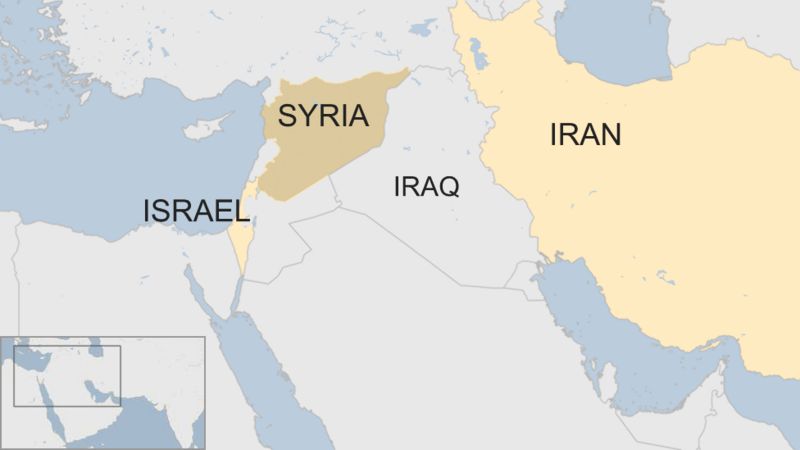Current Events and Tensions: Israel Iran News

The relationship between Israel and Iran remains highly volatile, marked by a long history of animosity and a series of recent escalations. Both countries view each other as existential threats, leading to a complex web of proxy conflicts, cyberattacks, and covert operations. The situation is further complicated by the presence of international actors with their own interests and agendas.
Recent Developments
The most recent developments in the Israel-Iran relationship have been characterized by a series of high-profile events and pronouncements. In January 2023, Iran announced the successful launch of a new generation of ballistic missiles, capable of reaching targets across the Middle East, including Israel. This event was met with strong condemnation from Israel, which accused Iran of seeking to destabilize the region.
In response to Iran’s nuclear program, Israel has repeatedly stated its willingness to take military action if necessary. This stance has been reinforced by the recent appointment of a hawkish Israeli Prime Minister, Benjamin Netanyahu, who has pledged to take a tough stance against Iran.
Tensions and Flashpoints
Several key areas of conflict contribute to the high level of tension between Israel and Iran. These include:
- Iran’s Nuclear Program: Israel considers Iran’s nuclear program to be a direct threat to its existence. Israel has repeatedly expressed its concern over Iran’s enrichment of uranium and its potential to develop nuclear weapons. The International Atomic Energy Agency (IAEA) has raised concerns about Iran’s lack of transparency and cooperation in its nuclear program. This issue has been a major source of tension between the two countries for decades.
- Iran’s Support for Proxy Groups: Iran is accused of supporting various militant groups in the region, including Hezbollah in Lebanon, Hamas in Gaza, and Palestinian Islamic Jihad. These groups have been involved in numerous attacks against Israel, and Israel has accused Iran of directly funding and training them. Israel’s military strikes against Iranian-backed groups in Syria and elsewhere have further escalated tensions.
- Cyberattacks: Both Israel and Iran have been involved in a series of high-profile cyberattacks against each other. These attacks have targeted government institutions, critical infrastructure, and private companies. The attribution of these attacks is often difficult, but experts believe that both countries have developed sophisticated cyber capabilities.
Role of International Actors
The Israel-Iran dynamic is also influenced by the actions of various international actors.
- The United States: The United States has been a key player in the Israel-Iran relationship for decades. The US has imposed sanctions on Iran in an attempt to pressure it to abandon its nuclear program and to curb its support for militant groups. The Trump administration withdrew from the Joint Comprehensive Plan of Action (JCPOA), a landmark nuclear deal between Iran and world powers, in 2018. This decision further strained relations between the US and Iran, and it also contributed to increased tensions between Israel and Iran.
- Russia: Russia has emerged as a significant player in the Middle East in recent years. Russia has close ties with Iran, and it has provided Iran with advanced military equipment. Russia has also been involved in the Syrian civil war, where it has supported the Syrian government, which is allied with Iran. Russia’s presence in the region has complicated the Israel-Iran dynamic, as it has created new avenues for cooperation and conflict between the two countries.
- The European Union: The European Union has been a vocal critic of Iran’s nuclear program and its support for militant groups. However, the EU has also sought to maintain diplomatic relations with Iran and to preserve the JCPOA. The EU’s position on Iran has been complicated by its own economic interests and its desire to maintain stability in the region.
Nuclear Program and Sanctions

Iran’s nuclear program has been a source of international concern for decades, raising significant questions about its intentions and the potential for regional instability. This section delves into the complexities of Iran’s nuclear ambitions, examining the effectiveness of international sanctions and the potential consequences of Iran developing nuclear weapons.
Iran’s Nuclear Program
Iran’s nuclear program has been a subject of international scrutiny since the 1970s, with its stated objective being the development of peaceful nuclear energy. However, concerns have been raised about Iran’s potential for developing nuclear weapons, fueled by its history of secrecy and its refusal to fully cooperate with international inspectors.
Iran’s nuclear program has evolved over the years, with key milestones including:
- 1970s: Iran began developing its nuclear program with the assistance of the United States, initially focusing on research and development.
- 1980s: Following the Islamic Revolution, Iran’s nuclear program was largely neglected.
- 1990s: Iran resumed its nuclear program, emphasizing the development of uranium enrichment capabilities.
- 2000s: International concerns escalated as Iran expanded its nuclear activities and refused to comply with international demands for transparency.
- 2015: The Joint Comprehensive Plan of Action (JCPOA) was signed, aiming to restrict Iran’s nuclear activities in exchange for the lifting of international sanctions.
- 2018: The United States withdrew from the JCPOA and reimposed sanctions on Iran.
Iran’s nuclear program has been a source of regional tension and instability, raising concerns about the potential for nuclear proliferation and an arms race in the Middle East. The program has also been a major factor in the strained relationship between Iran and the West.
Effectiveness of Sanctions
International sanctions have been imposed on Iran for decades, targeting its nuclear program, human rights violations, and support for terrorism. These sanctions have had a significant impact on Iran’s economy, but their effectiveness in curbing its nuclear ambitions has been debated.
Impact of Sanctions on Iran’s Economy
International sanctions have significantly impacted Iran’s economy, leading to:
- Reduced oil exports: Sanctions on Iran’s oil exports have significantly reduced its revenue, affecting its ability to fund its nuclear program.
- Limited access to financial markets: Sanctions have restricted Iran’s access to international financial markets, making it difficult to obtain loans and investments.
- Reduced foreign investment: Sanctions have deterred foreign investment in Iran, hindering economic growth and development.
- Inflation and currency devaluation: Sanctions have contributed to inflation and the devaluation of the Iranian Rial, impacting the purchasing power of ordinary citizens.
Effectiveness of Sanctions in Curbing Iran’s Nuclear Program
The effectiveness of sanctions in curbing Iran’s nuclear program is a complex issue. While sanctions have imposed significant economic hardship on Iran, they have not entirely stopped its nuclear program.
- Continued nuclear activities: Despite sanctions, Iran has continued to advance its nuclear program, albeit at a slower pace.
- Potential for sanctions evasion: Iran has developed methods to evade sanctions, including through illicit financial transactions and smuggling.
- Domestic support for nuclear program: The Iranian government has maintained domestic support for its nuclear program, arguing that it is essential for national security and energy independence.
Potential Consequences of Iran Developing Nuclear Weapons
The potential consequences of Iran developing nuclear weapons are significant and far-reaching, potentially impacting regional security, global stability, and the non-proliferation regime.
Impact on the Middle East
The development of nuclear weapons by Iran could have a profound impact on the Middle East, potentially leading to:
- Nuclear arms race: Iran’s acquisition of nuclear weapons could trigger a nuclear arms race in the region, with other countries seeking to develop their own nuclear capabilities.
- Increased tensions and conflicts: The presence of nuclear weapons in the region could increase tensions and the risk of military conflict, potentially leading to a devastating war.
- Destabilization of the region: The development of nuclear weapons by Iran could destabilize the region, undermining efforts to promote peace and security.
Impact on Global Security
The development of nuclear weapons by Iran could also have significant implications for global security, potentially leading to:
- Weakening of the non-proliferation regime: Iran’s acquisition of nuclear weapons could undermine the international effort to prevent the spread of nuclear weapons.
- Increased risk of nuclear terrorism: The development of nuclear weapons by Iran could increase the risk of nuclear terrorism, as terrorist groups could potentially acquire or steal nuclear materials.
- Global instability: The development of nuclear weapons by Iran could contribute to global instability, increasing the risk of nuclear conflict and the use of nuclear weapons.
Regional Dynamics and Proxy Conflicts

Israel and Iran have long been engaged in a complex and multifaceted rivalry that extends beyond their own borders, playing a significant role in shaping the dynamics of regional conflicts and influencing the stability of the Middle East. Both countries have been involved in various proxy conflicts, utilizing non-state actors to advance their strategic interests and exert influence in the region.
The Syrian Civil War
The Syrian civil war has become a major battleground for the proxy conflict between Israel and Iran. Iran, a staunch ally of the Syrian government, has provided significant military and financial support to President Bashar al-Assad, deploying its own forces and backing Hezbollah, a Lebanese Shiite militia, which has played a crucial role in supporting the Syrian regime. Israel, on the other hand, has been concerned about Iran’s growing influence in Syria, particularly its establishment of military bases and the transfer of advanced weapons to Hezbollah. Israel has conducted numerous airstrikes against Iranian targets in Syria, aiming to prevent Iran from consolidating its presence and bolstering Hezbollah’s capabilities.
The Lebanese Conflict, Israel iran news
Lebanon has been a focal point of the Israel-Iran rivalry, with Hezbollah, backed by Iran, playing a prominent role in Lebanese politics and security. Israel considers Hezbollah a major threat, viewing its arsenal of rockets and missiles as a direct challenge to its security. The 2006 Lebanon War, triggered by Hezbollah’s capture of two Israeli soldiers, resulted in a month-long conflict that highlighted the complex dynamics of the Israel-Iran rivalry in Lebanon. While Israel aims to prevent Hezbollah from acquiring advanced weaponry and launching attacks against its territory, Iran seeks to maintain its influence in Lebanon and support Hezbollah as a key strategic asset.
The Palestinian-Israeli Conflict
The Palestinian-Israeli conflict has also been influenced by the Israel-Iran rivalry, although less directly than in Syria and Lebanon. Iran has provided financial and military support to Palestinian militant groups like Hamas, which governs the Gaza Strip. While Israel has expressed concerns about Iranian influence in Gaza, it has not directly targeted Iranian interests in the Palestinian territories. The Palestinian-Israeli conflict remains a complex and multifaceted issue with numerous actors and interests at play, and Iran’s role in supporting Palestinian groups is one aspect of this intricate dynamic.
Israel iran news – The ongoing tensions between Israel and Iran continue to dominate headlines, with recent developments focusing on the potential for renewed conflict. However, amidst the geopolitical turmoil, a different kind of news caught the attention of consumers: Walmart recalls candy.
This unexpected event serves as a reminder that even in times of global uncertainty, everyday life continues to unfold with its own set of challenges and surprises. As the situation between Israel and Iran remains fluid, it is important to stay informed and consider the impact of these events on a wider range of issues, including consumer safety and product recalls.
Israel-Iran news often focuses on tensions and potential conflicts. Understanding the historical context of these tensions is crucial, especially when considering the potential for an iran attack. Such an event could have significant ramifications for the region and beyond, making it a subject of intense scrutiny in Israel-Iran news.
